Understanding how students grasp complex science concepts is crucial in education. Formative assessment plays a key role in this process by providing ongoing feedback that can inform instructional strategies. This article explores the principles of formative assessment in the science classroom and its impact on student learning.
We’ll discuss strategies educators can employ to gauge comprehension and foster a deeper engagement with scientific material. This article will also outline how EdTech tools ClassPoint can be utilized for effective science skill assessment, drawing inspiration from the successful use of ClassPoint in math teaching and more.
Table of Contents
Overcoming Challenges in Science Formative Assessment
Science formative assessments are essential for understanding students’ comprehension and progress, but they often come with unique challenges:
- Diverse Learning Styles and Abilities: One of the main challenges in science education is catering to students’ diverse learning styles and abilities.
Recommendation 👍: If you’re looking to diversify your teaching strategies, look into interactive tools such as quizzes, slide drawing, and embedded browser features. These tools enable teachers to create a variety of engaging lessons, from visual concept mapping to real-world teaching, accommodating different learning preferences and helping all students to engage with the content actively.
- Time Constraints in Curriculum Delivery: Teachers often struggle with limited time to cover extensive science curriculums and assess student understanding effectively.
Recommendation 👍: A quick poll and AI quiz generator can help streamline the assessment process. Teachers can quickly gauge student comprehension without extensive preparation time, allowing for more efficient use of classroom sessions.
- Ensuring Active Participation and Engagement: Keeping students actively engaged, especially in complex science topics, is always a challenge for teachers.
Recommendation 👍: Interactive questions and gamification motivate students to participate. Try a random name picker to ensure that all students have an equal chance to contribute, fostering a more inclusive and interactive learning environment.
- Providing Immediate and Constructive Feedback: Immediate feedback is crucial in formative assessment, yet it can be challenging to provide personalized feedback promptly.
Recommendation 👍: We suggest teachers to try quiz and assessment tools with instant feedback and exportable analytics. This helps students correct misunderstandings on the spot and allow teachers to personalise the feedback for improvement.
By leveraging ClassPoint's features, educators can effectively address these challenges, making science formative assessment a more efficient, engaging, and inclusive process. This leads to a deeper understanding of science concepts among students and a more dynamic and interactive classroom environment.
5 Innovative Science Formative Assessment Examples
In the dynamic world of science education, EdTech tools like ClassPoint offers a range of innovative formative assessment solutions that cater to diverse learning styles and enhance student engagement.
Check out these 11 online formative assessment tools to help put you on the right track.
By integrating these innovative solutions and activities, educators can not only assess but also significantly boost students’ understanding and involvement in science topics. Try them out now for your next science class:
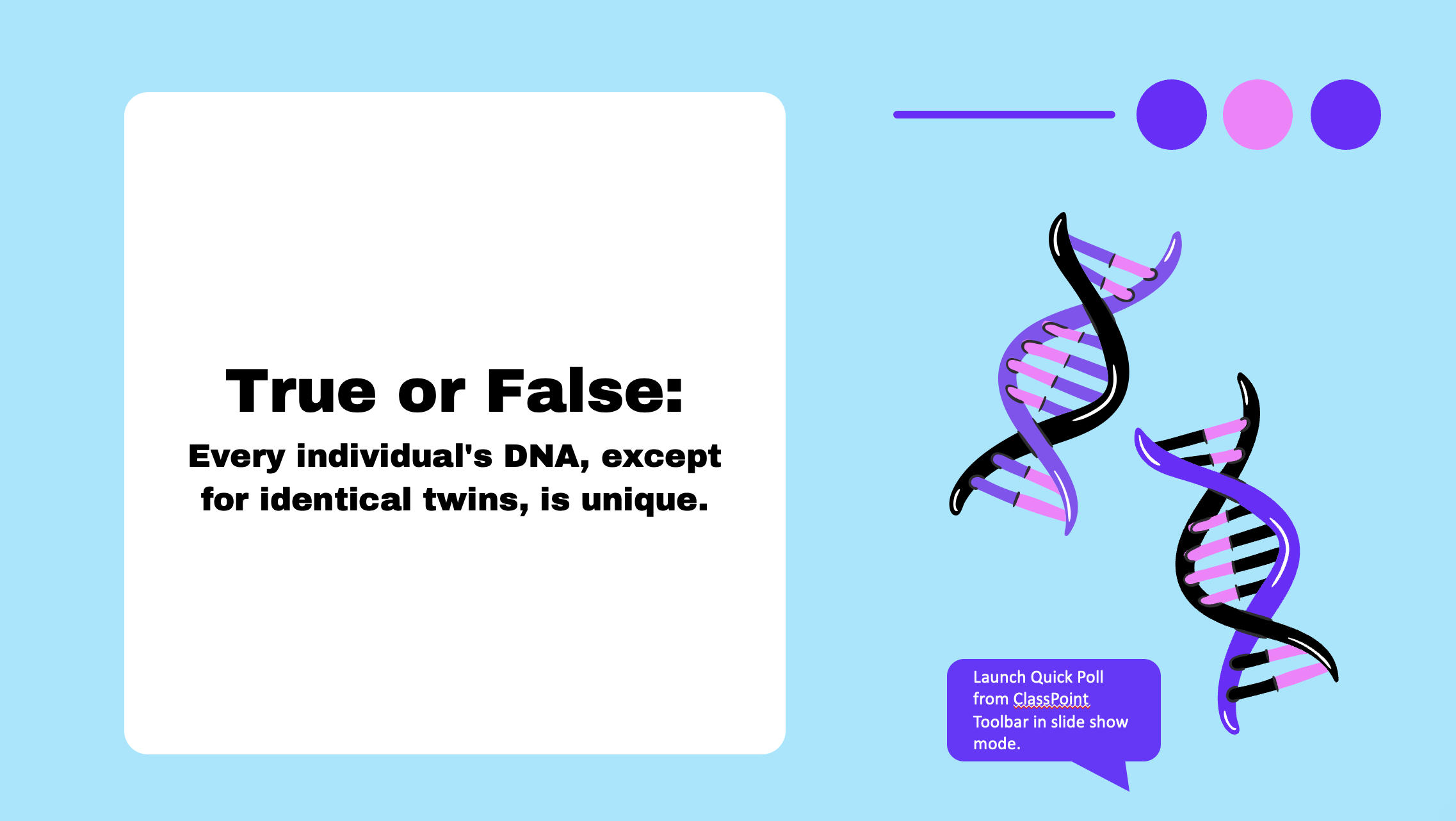

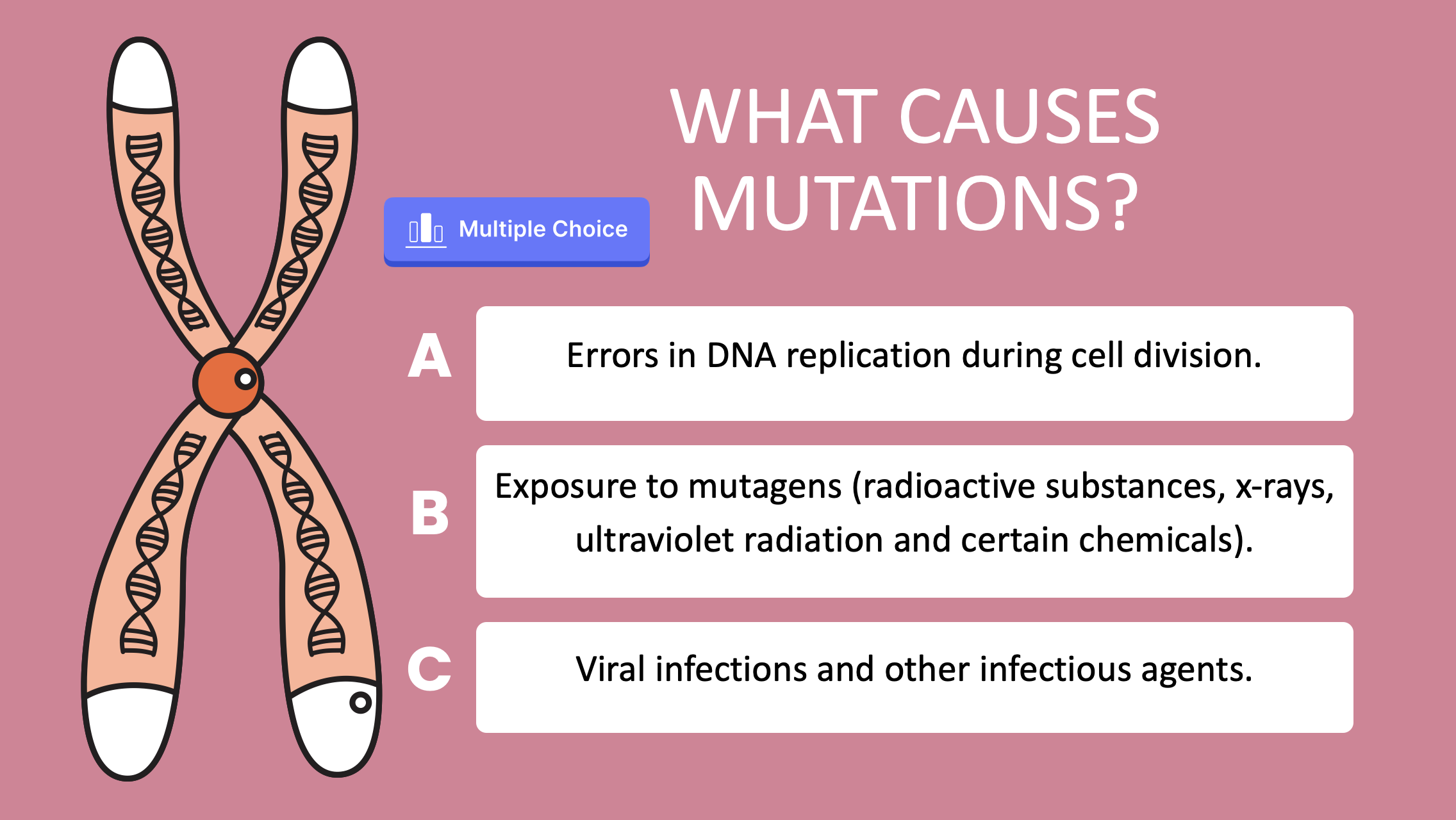
Science Formative Assessment Templates
Create better science formative assessment experience in the classroom now!
1. Interactive Science Quizzes with Automatic Grading
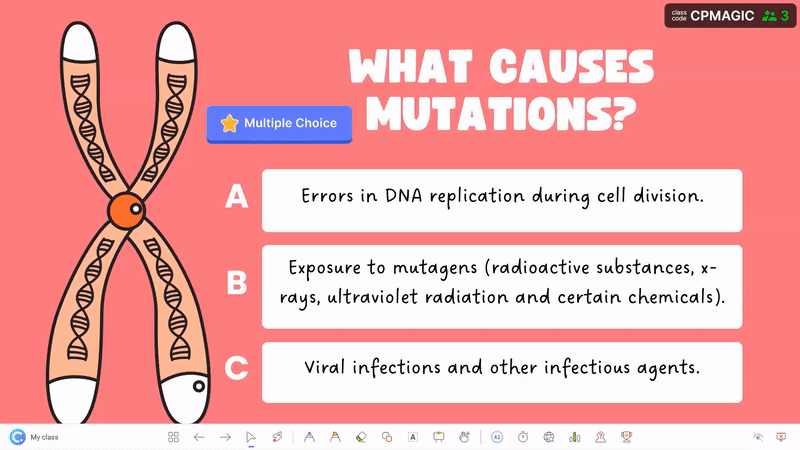
An exemplary form of science formative assessment is Interactive Science Quizzes. They elevate learning through engagement and instant feedback.
Tools like ClassPoint allows the integration of interactive quizzes directly into PowerPoint presentations. These quizzes can include various question types like multiple choice, short answer, and fill-in-the-blanks, making them ideal for assessing students’ knowledge in an engaging way.
Here’s how you can create a Science MCQ with automatic grading:
- Create a slide in PowerPoint with your science question and multiple-choice options.
- Click on the ClassPoint tab in PowerPoint and select the ‘Multiple Choice’ icon to add an interactive button to your slide.
- In the side panel, configure the number of choices, and set the correct answers (e.g., A, B, D, and F).
- Activate Quiz Mode in ClassPoint, which automatically awards stars based on question difficulty.
- Present the slide during class. Students join via classpoint.app and submit answers from their devices.
- Monitor real-time responses, offer instant feedback, and foster a competitive yet collaborative learning environment.
Tips for Implementing:
- Use quizzes for introductory or revision topics.
- Blend quizzes with open-ended questions.
- Try a variety of quiz types.
Who It's For: Teachers seeking quick assessments of student understanding in various science topics.
2. Lab Experiment Formative Assessments
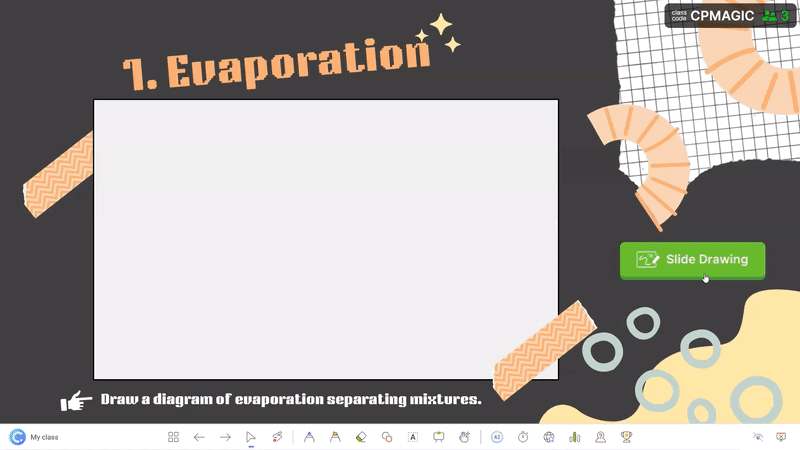
Lab experiment is an effective science formative assessment that enables students to cultivate critical thinking skills, practical application of scientific concepts, and a deeper understanding of the scientific method through hands-on exploration and analysis.
They can be easily turned into graded assessments using Short Answer and Slide Drawing. This way, students can draw and annotate their findings and results, deepening their understanding of scientific methods and findings. Teachers can also facilitate discussion surrounding the experiments using annotation and whiteboard features.
Here’s how you can invite students to submit answers through Slide Drawing:
- Start with a PowerPoint slide with a lab experiment question.
- Click on the ClassPoint tab in PowerPoint and select the ‘Slide Drawing’ icon to add an interactive button to your slide.
- Instruct students on how to annotate directly on their devices. For instance, ask them to mark significant data points, draw connections, diagrams, or write hypotheses.
- Present the slide during class. Students join via classpoint.app and submit answers from their devices.
- Monitor real-time responses, offer instant feedback, and foster a competitive yet collaborative learning environment.
Tips for Implementing
- Encourage detailed observations.
- Guide discussions towards learning objectives.
- Assure students that there is no need for perfect drawings.
Who It's For: Ideal for classes where lab experiments and data analysis are integral to the curriculum.
3. Science Quiz Games & Trivia
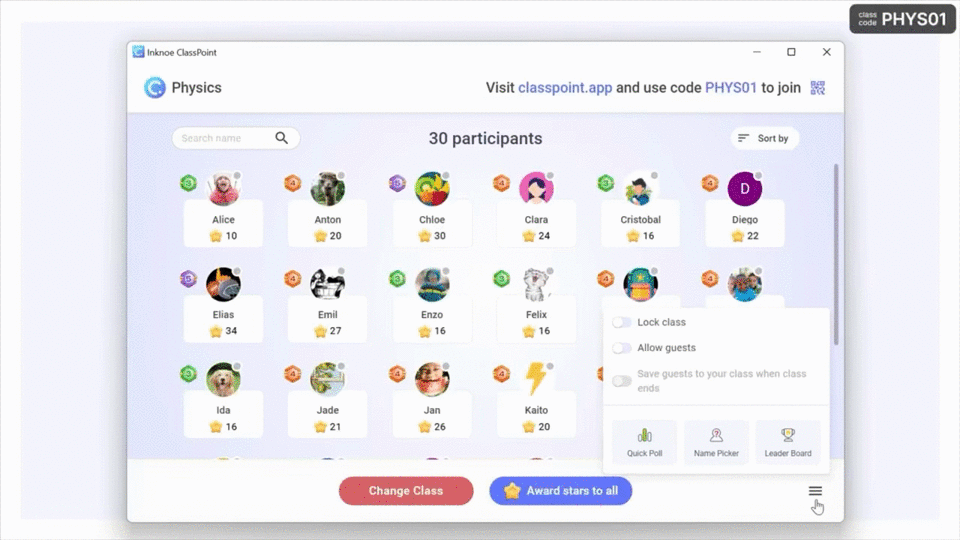
Turning your classroom into a gameshow is a tried and true strategy any teacher will swear by. It keeps the class engaged, it makes learning fun, and overall, you’ll quickly see how your class is transformed when you bring a quiz game into the mix.
Here’s how you can do it:
- Create multiple PowerPoint slides with trivia questions for your class to answer. Alternatively, use this template as inspiration.
- Click on the ClassPoint tab in PowerPoint and select the ‘Multiple Choice’ icon to add an interactive button to your slide.
- Divide students into groups using Name Picker or Grouping feature.
- Present the slide during class. Students join via classpoint.app and submit answers from their devices.
- Award stars to individual student or group and display a leaderboard at the end of your lesson to showcase the winners.
Tips for Implementing
- Communicate game rules effectively.
- Ensure a supportive environment.
- Ensure collaboration and healthy competition.
Who It's For: Ideal for science classes where students don't often participate. The gamified aspect encourages all students to choose an answer and collect stars as a reward.
4. Quick Science Polls for Instant Feedback
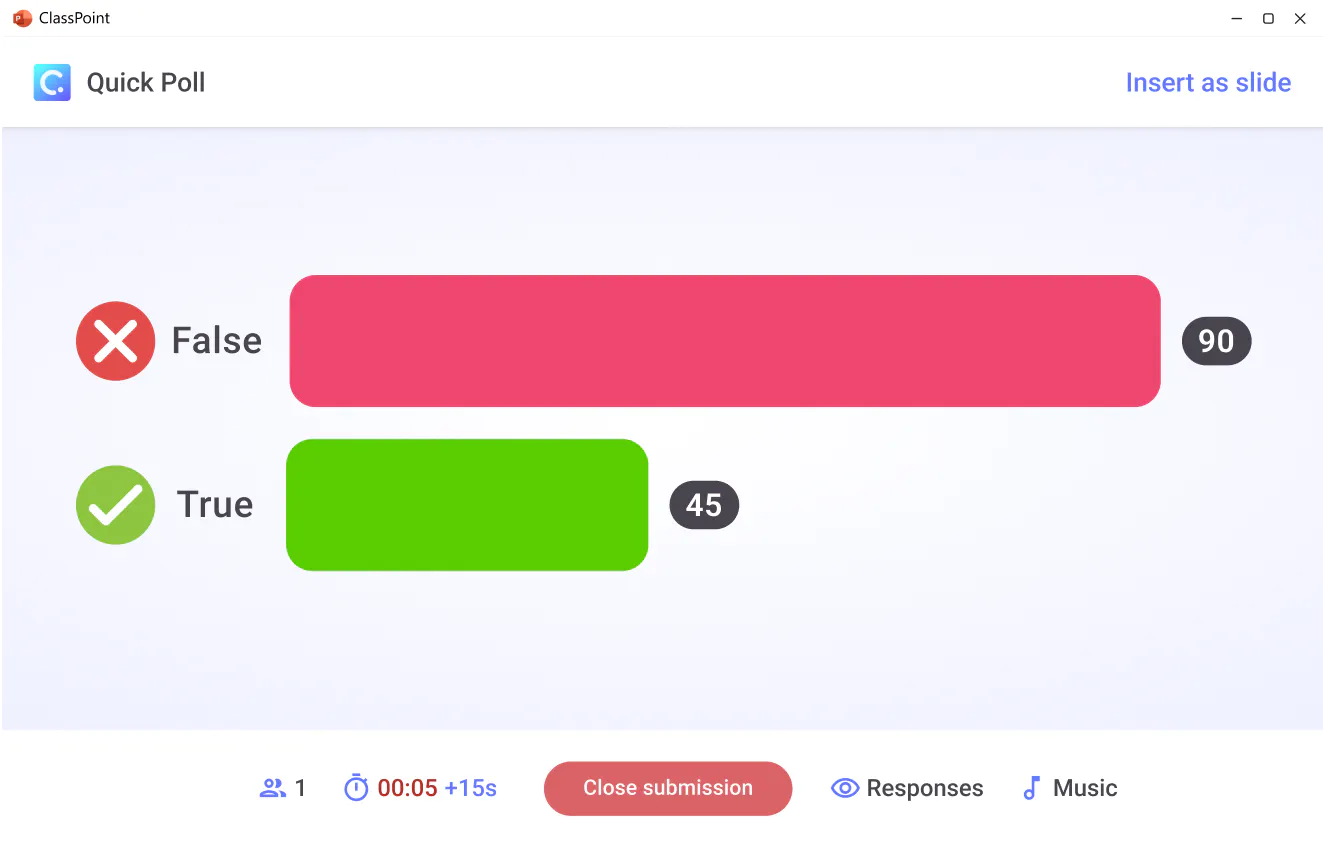
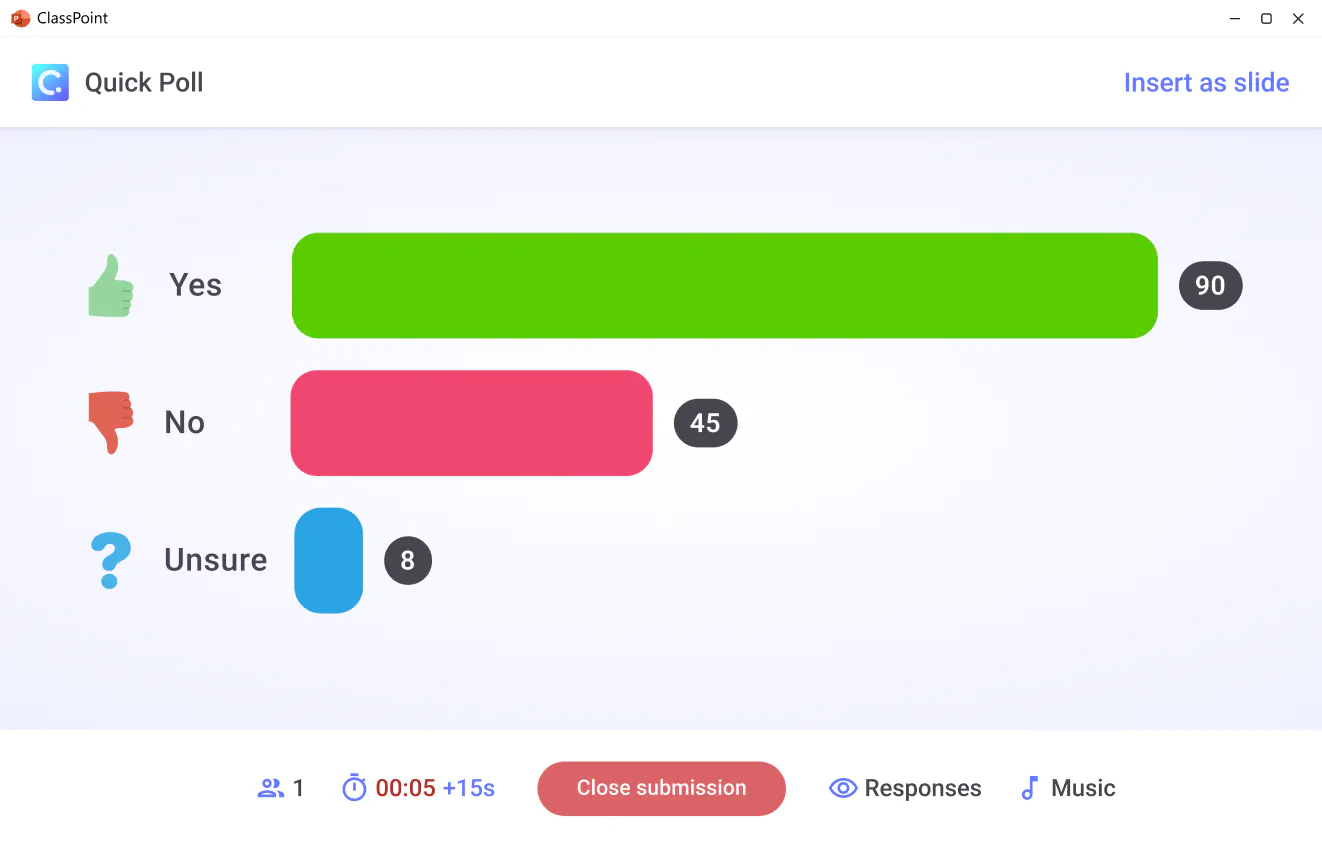
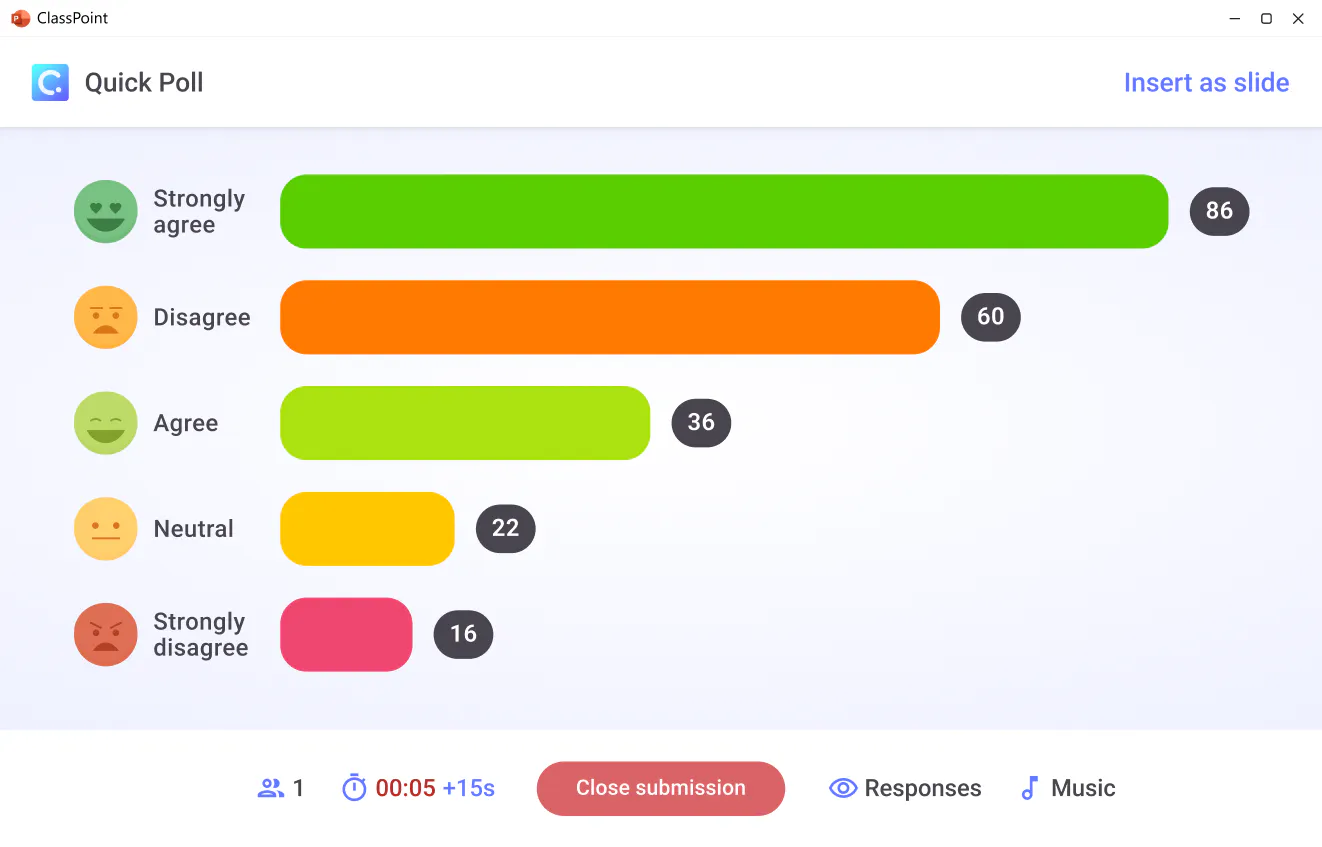
Quick poll is particularly useful for quickly gauging students’ understanding, gathering opinions, or initiating discussions on various scientific topics. This interactive method keeps students engaged and allows teachers to instantly assess the class’s comprehension and adjust the lesson accordingly.
ClassPoint’s Quick Poll feature is a dynamic and efficient tool for real-time feedback during science lessons.
Here’s how you can do it:
- During your PowerPoint presentation, click on the Quick Poll icon in the ClassPoint toolbar at the bottom of your screen.
- Select from various preset options like true/false, yes/no/unsure, or a five-level feedback scale.
- Pose the question verbally and initiate the poll. Students respond using their devices via classpoint.app.
- Immediately review and discuss the results, providing instant feedback or further clarification.
- Optionally, save the poll results by inserting them as a slide in your presentation for future reference or assessment.
Tips for Implementing
- Encourage honest, impromptu responses.
- Follow up with detailed discussions or explanations.
Who It's For: Best suited for educators who want to quickly assess student understanding or gather opinions on science topics, creating an interactive and responsive classroom atmosphere.
5. AI-Powered Science Formative Assessments
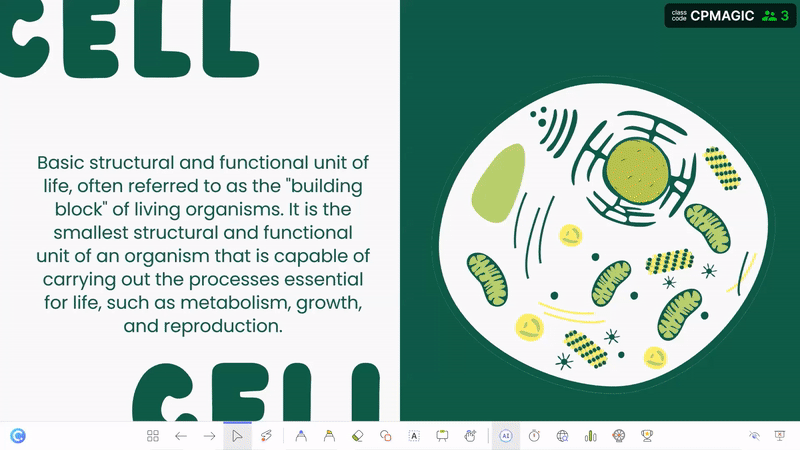
AI quiz generators allow for seamless and adaptive questioning, ensuring teachers can create assessments tailored to the individual’s learning pace and understanding in a matter of seconds. Moreover, most AI quiz generators provide educators with detailed insights into each learner’s grasp of scientific concepts, allowing teachers to tailor their teaching approach to their student needs.
ClassPoint AI is one such tool that presents a cutting-edge approach to create instant science assessments in PowerPoint.
Here’s how you can do it:
- Open a PowerPoint slide with at least 2 words. (Pro Tip: For more accurate quiz questions, include more phrases and texts in the slide.)
- Enter slide show mode and activate the ClassPointAI feature at the bottom toolbar.
- Select the quiz format and Bloom’s Taxonomy levels.
- The AI will then scan your PowerPoint slide and generate quiz questions based on your slide content.
- Students can participate the quiz live via classpoint.app and submit answers from their devices.
- Use the suggested answers and insights provided by the AI to offer personalised feedback and adapt future lessons accordingly.
Tips for Implementing:
- Double check questions for accuracy.
- Utilize data for targeted teaching strategies.
Who It's For: Ideal for educators who are keen to implement the latest technology in their teaching and provide a personalized learning journey for each student in science education.
Expert Tips for Implementing Science Formative Assessment
- Regular Implementation: Consistent use of formative assessments is key in monitoring students’ progress and understanding over time. By integrating these tools into your regular teaching routine, you can track learning trends, identify knowledge gaps early, and adjust your teaching strategies to meet the evolving needs of your students.
- Diverse Techniques: Leverage various activities and techniques to cater to diverse learning styles. This includes not just quizzes but also interactive activities like brainstorming with word clouds, using the audio record for verbal responses, and engaging students in group discussions, ensuring that your science formative assessments are inclusive and engaging for all students.
- Clear Feedback: Real-time feedback allows for immediate clarification and guidance. It’s crucial to provide feedback that is not only timely but also constructive, helping students understand where they excel and what areas need improvement. This ongoing feedback loop enhances learning outcomes and student confidence.
- Student Involvement: Encourage students to take an active role in their learning journey through self-assessment and peer feedback. This not only enhances their understanding of the subject matter but also develops critical thinking and evaluative skills.
- Data-Driven Decisions: Data analytics provide valuable insights into student performance and class trends. Use data provided by EdTech tools to make informed decisions about your teaching methods, curricular focus areas, and to personalize learning experiences for individual students or groups.
- Encourage Growth Mindset: Creating a classroom culture that views challenges and mistakes as opportunities for growth and learning is crucial for scientific inquiry and discovery. Foster a safe space where students can experiment, make mistakes, and learn from them.
Elevate Your Science Formative Assessments Today!
Integrating digital formative assessment tools like ClassPoint into your science teaching strategy can significantly enhance student engagement and understanding. These tools not only provide innovative assessment methods but also enable a more interactive and efficient teaching process.
Try ClassPoint with this free Science formative assessment template and transform your science classes into dynamic and interactive learning experiences.



Science Formative Assessment Templates
Create better science formative assessment experience in the classroom now!
For more resources and insights into effective science teaching strategies, continue exploring our content.

